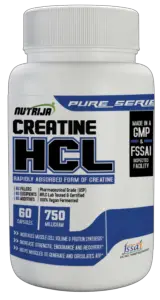Creatine HCL (hydrochloride) is a kind of creatine that has recently gained favour as a sports supplement. Creatine is a naturally occurring amino acid present in minute levels in meals such as meat and fish, as well as in the body. It is thought to increase athletic performance because it plays a critical role in the generation of ATP, the major energy source for muscular contractions.

Compared to other forms of creatine such as creatine monohydrate, creatine HCL is more water soluble and thus absorbed by the body more quickly and efficiently. This is because the hydrochloric acid molecule helps break down the creatine molecule, making it easier for the body to absorb.
One potential benefit of creatine HCL is that it may have a stronger effect on muscle strength and power than other types of creatine. In some studies, creatine HCL appears to improve muscle endurance, power, and performance more than creatine monohydrate.

According to a study published in the Journal of the International Society of Sports Nutrition, creatine HCL supplementation improved lower-body power output in healthy adults compared with placebo. In another study published in the Journal of Strength and Conditioning Research, creatine HCL supplementation was more effective than creatine monohydrate at improving upper-body strength.
Individual reactions to creatine HCL supplementation may vary, and additional study is needed to completely understand the effects of this type of creatine on athletic performance.

It is also critical to carefully follow dose guidelines when using creatine HCL, since taking too much might result in adverse effects such as stomach discomfort, dehydration, and muscular cramping. Starting with a smaller quantity of creatine HCL (such as 1-2 grammes per day) and gradually increasing the amount as needed, up to a maximum of 5-6 grammes per day, is typically suggested.

Overall, Creatine HCL is a popular sports supplement believed to improve athletic performance by increasing the production of ATP, the primary energy source for muscle contraction. More research is needed to fully understand the effects of this form of creatine, but some studies suggest that it may be more effective than other forms of creatine.